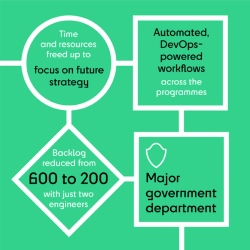A product is as good as its product team
Products are all about people — that's why it's paramount to support the product teams behind them. Our Senior Delivery Lead Juan explains why in his blog post.
Read more
A well-designed teamwork structure comes from the intricate balance of shared values, beliefs, and behaviours that define an organisation. Within engineering teams, culture is the foundation for seamless cooperation, efficient problem-solving, and transparent communication. A robust culture creates a unified sense of purpose, builds trust, and lets ideas flow freely. On the flipside, a disjointed or toxic culture can generate silos, erode accountability, and even lead to projects failing.
To develop a thriving culture, teams should embrace failure to turn setbacks into opportunities for growth. Matthew Syed, in his book "Black Box Thinking" eloquently captures the essence of this journey: "The most successful people and organisations in fields from aviation to medicine, and from business to politics, are those that have cultures that support openness, honesty, and a willingness to learn from mistakes." Cultivating a culture of openness and learning gives engineering teams the resilience and adaptability they need to navigate shifting terrains and seize new opportunities — all to ultimately craft a competitive edge that sets them apart.
Evaluating engineering teams’ culture is essential. It highlights strengths and weaknesses, empowers leaders to pinpoint opportunities for growth, and lets the teams align their values and behaviours with the company’s wider mission and goals. Finally, tracking cultural progress over time will let you make sure that changes you implement over time resonate with the outcomes you’re trying to achieve.
Promoting diversity and inclusion has a key part to play when you’re nurturing a strong culture within your engineering teams. Diverse teams weave together a mosaic of perspectives and experiences, which pave the way for innovative and creative problem-solving. By fostering an inclusive environment where everyone feels valued and heard, you can unleash your workforce’s full potential and create more dynamic and adaptable engineering teams.
Providing mentorship and professional development opportunities is another great way to galvanise positive and productive cultures in engineering teams. By giving team members access to resources and the chance to be guided by seasoned professionals, you’ll be supporting your teams’ growth and skill development. This, in turn, creates a culture of continuous learning, which in invaluable in an industry evolving as quickly as tech.
There are lots of methods you can use to learn about culture in your engineering teams, including surveys, focus groups, and interviews to name a few. Whichever path you choose to go down though, I can’t overstate how important it is to choose a tool that collects the data reliably and accurately. If your participants are 100% sure that their feedback will be anonymous, you’ll be much more likely get candid and useful information. I’ll cover some tools you can use for this below.
Chart the course: before you set out to measure culture, I would advise you to map out what you want to achieve in your measurement, and what you ultimately want the culture to be like. This could include creating a culture of innovation, collaboration, or accountability. With a clear vision in mind, you can begin to assess to which extent your team lives and displays these values.
Select a trusted instrument: to make sure that the data you collect is both reliable and accurate, use a validated instrument such as the Organisational Culture Assessment Instrument (OCAI ) or the Denison Organisational Culture Survey.

The Organisational Culture Assessment Instrument (OCAI). Source
Keep it anonymous: encourage honest feedback by ensuring responses remain anonymous. You can use third-party survey providers or a secure online platform to do this.
Share the findings and take action: once you’ve gathered the data, share the results with the team and make an action plan to change the areas earmarked for improvement. This could involve offering your teams training or coaching, or adjusting policies and procedures that are hindering the results you want to see.
In today's dynamic technological landscape, the path to success for engineering teams hinges on so much more than recruiting skilled professionals. To truly succeed, you need to develop a culture that champions collaboration, nurtures innovation, and embraces continuous improvement. Measuring and refining culture will be your guiding compass for achieving these goals — letting teams identify areas of strength and weakness, align their values with the company's mission, and track their progress over time.
By tuning into feedback loops and concentrating on incremental gains, engineering teams can continuously elevate their performance and traverse the path to success. And by embracing failure and viewing it as a valuable opportunity to change and learn, teams can foster a more harmonious culture where members feel empowered to take risks and learn from their experiences in a judgment-free space. In essence, measuring culture is not only essential for building effective engineering teams, but also for creating a culture of continuous improvement and embracing failure as a catalyst for growth.
By prioritising these elements at your organisation, you can build a bedrock for thriving engineering teams that don’t only overcome talent shortages, but also contribute to the UK tech sector's success as a whole.

Products are all about people — that's why it's paramount to support the product teams behind them. Our Senior Delivery Lead Juan explains why in his blog post.
Read more
We built DevOps-powered workflows to automate proceses and hugely boost efficiency for a major government department.
Read more
What are cloud engineers’ common pitfalls, and how can you avoid them to ace your productivity? Our cloud partner Ben Snape is a seasoned cloud engineer, and tells all in his blog post.
Read moreGet the inside scoop — delivered straight to your inbox.